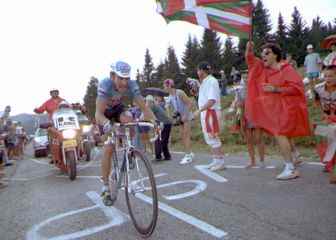Forty degrees of temperature and more than 50 km/h for 64 kilometers to melt time. Two minutes difference with respect to Tony Rominger, second classified, full of energy and ready to shake the dynasty. Miguel Indurain’s time trial in Bergerac, in the ninth stage of the 1994 Tour, ratified for the umpteenth time the extraterrestrial condition that the French press had already attributed to him. One of the most imposing and exciting displays of him. One that, in the partial classification, left Piotr Ugrumov, with much, much to say yet, at 6:04 minutes, in tenth position. “If you remember me as a rival, it is already a privilege”, the former Latvian cyclist undoes in the documentary The Victims of Indurainfrom Movistar +. After what I experienced in the first person, words of praise and respect. Dedication to a Martian who, at certain moments, he made feel human.
The story of Piotr Ugrumov, like that of so many other colleagues from the decade, is full of lights and shadows. Born in Riga, in 1961 (61 years old), he is considered the best Latvian cyclist in history. From the school of the harsh Alexander Kuznetsov, whose draconian methods made Berzin, among others, flee, he did not reach professionalism until perestroika, like so many other Soviets, already 27 years old. Without going any further, he was a lieutenant in the Red Army and grew up in Alfa Lum, the cradle of the great cyclists of the USSR. After a brief stint in Spain, where he competed in the Seur, scoring the Tour of Asturias and the Luis Ocaña Trophy (1991), was added to the birth of Mecair, the Italian squad that joined the peloton in 1993 and that, already under the name of Gewiss, was affected by systematic doping. In 1999, the production the price of silencefrom DanmarksRadio, showed it to the public sphere; shortly after, L’Equipe revealed the variation in hematocrit levels in the team’s cyclists between 1994 and 1995. All of them, recorded in the files that Dr. Michele Ferrari, one of the introducers of EPO in the competition, kept in his office. Ugrumov’s percentage, the highest and fastest growing, went from 32.8% to 60%. The rumor mill of the time even placed him higher, thereby putting his life in serious danger.
“If you remember me as a rival, it’s already a privilege”
Piotr Ugrumov, former Latvian cyclist
With that rucksack of controversy and vital and sporting experiences, then, it must be understood what Ugrumov, defenestrated in the general classification, was about to star in that 1994 Tour. His round was not going well and the 12th start seemed to bury his chances of sticking his head among the aristocracy. Nothing is further from reality. In Luz Ardiden, excusing himself in an emergency visit to the dentist (anesthesia and EPO…), he lost more than five minutes compared to Indurain. And in the Alpe d’Huez it failed again, but in Val Thorens it was resurrected in a monstrous way. After several attacks on La Madeleine, the good one would arrive, the one that changed everything. He left with his teammate Bjarne Riis and a ‘Cacaíto’ Rodríguez without any intention of taking over, ultimately winning the stage and witnessing the start of one of the most impressive comebacks in history.
Two and a half minutes less distance with respect to Miguelón, with an insurmountable income, but that would be drastically reduced. Ugrumov, in three days, cut 8:29 minutes from the Spanish cyclist, going from ninth to second place in the Tour general, the fourth followed by Indurain. In Moutiers-Cluses, arrival alone after a kilometric escape hunting the fugitive Arturas Kasputis; in the Avoriaz time trial, the final coup de grace. Under the rain and in the Villava locomotive business, which he did not want to risk in the descent, he certified his podium. Behind Indurain (at 5’39”), of course, like the rest of his victims.
From the 1993 Giro to today
An epic story between the Spanish cyclist and the Latvian, but not the only one. A year earlier, Ugrumov had already launched the ad. And very serious. In the 1993 Giro d’Italia he was also relegated to the second step, in the shadow of Indurain, but making him tremble like no one else. The 58 seconds that ended up separating them in the general classification represent the lowest income for the Navarrese in his seven great laps. As strong as he is light, Piotr arrived in Italy undetected by radar, which pointed to Chiappucci as an alternative, but he left presenting his candidacy for the gold club of climbers at the time.
“The climb to the sanctuary of Oropa was the only finish of the Giro in which Induráin could have a bad time”, explained the director of Mecair, Emmanuele Bombini, after the penultimate day of the round. During it, a all in frustrated, but straight to the history of cycling. Moreno Argentin moved the hornet’s nest and Ugrumov, despite his initial reluctance, accepted the challenge. He arrived at the stage 1:34 minutes behind Indurain, after a surprising time trial in which Miguelón, destined to seal his second corsa rosa, had only been able to get twenty seconds off him, and he threw the rest. Six kilometers from the end, on the most demanding ramp, he released ‘Big Mig’ to cross the finish line alone. 36 seconds of difference that, if not for Indurain’s cunning, could have been much more. “He’s very, very, very smart,” Argentin later declared of the Spaniard. A piece of history in some Italian lands where, currently, Ugrumov is still linked to cycling. He retired in 1999 at the national Ballan and, after being director of a Latvian team, he settled in Rimini, where he began passing on his knowledge to a local team. He goes into the lessons, sure, the adventures and misadventures with Indurain.
